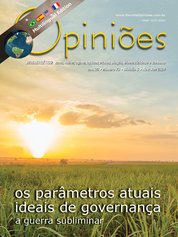Nelson Cury Filho
Fundador do FBFE – Fórum Brasileiro da Família Empresária
OpAA78
ESG&I: a nova face da governança
As sucessivas crises que ocorrem em escala global, quase que na velocidade da luz, como o exemplo mais recente da guerra entre Israel e Hamas, demandam um novo olhar em relação à governança e à gestão do patrimônio das famílias empresárias. Não concentre. Diversifique. Essa é a máxima do mundo “policrise”.
Nas últimas décadas, as transformações e as inovações têm ocorrido em um ritmo frenético, ampliando os desafios à sobrevivência dos negócios familiares.
Deixamos para trás o mundo VUCA (volatility, uncertainty, complexity e ambiguity) que se notabilizou no cenário empresarial pelas profundas mudanças tecnológicas nos anos 90. O acrônimo VUCA foi utilizado, inicialmente, pelos militares norte-americanos para definir o ambiente pós-guerra fria.
Com a pandemia, migramos para o mundo BANI (brittle, anxious, nonlinear e incomprehensible). Em português: frágil, ansioso, não linear e incompreensível. Concebido pelo antropólogo e futurista norte-americano, Jamais Cascio, o conceito BANI representa a possibilidade de tudo mudar instantaneamente, sem explicação, sem que tenhamos controle algum sobre as mudanças.
Já o termo policrise, criado na década de 90 pelo filósofo francês, Edgar Morin, foi resgatado no começo desse ano pelo Fórum Econômico Mundial, em Davos, para se referir às crises que acontecem ao mesmo tempo, as quais interagem e potencializam entre si. Nesse cenário, a perpetuidade do patrimônio está atrelada à diversificação dos negócios e à alocação estratégica da carteira dos ativos – investimentos, participações acionárias, entre outros – com a criação de valor a longo prazo.
Há cada vez menos espaço para o antigo modelo de empresa familiar, aquele modelo de negócio no qual o “dono” é proprietário e gestor, com processos decisórios centralizados e a operação do dia a dia a cargo dos membros da família.
Com o fundador focado 100% na gestão diária do negócio, não é de se estranhar que falte tempo para pensar estrategicamente, com visão de futuro e de longo prazo, o que acaba contribuindo para o índice elevado de mortalidade das empresas familiares. No Brasil, em que 90% das organizações têm esse perfil, 30% sobrevivem a segunda geração e apenas 3%, a terceira geração.
A nova face da governança familiar é transformar a família empresária em família investidora, uma evolução do modelo anterior. A diversificação de investimentos transcende o negócio, aumenta seus ativos e perpetua seu patrimônio ao longo das gerações. Há uma preocupação genuína em garantir e planejar a longevidade patrimonial na totalidade.
Como descreve o professor Thomas Zellweger, da universidade suíça St. Gallen, a família empresária se caracteriza por uma governança familiar, corporativa, estruturada e ativa (Conselho Consultivo ou de Administração, Conselho de Família, Acordo de Acionistas, Gestão Profissionalizada, Planejamento Sucessório, Código de Conduta, com divisão de responsabilidades dos gestores familiares e estruturação do family office).
O ciclo de vida das empresas familiares pode ser curto, mas a família investidora tem horizonte de longo prazo, busca alternativas para perenizar sua riqueza através das gerações, seja como acionista ou como investidora. O modelo se assemelha a uma family equity firm.
As turbulências recentes, especialmente o conflito Rússia e Ucrânia, mudaram a percepção de risco de investimentos. A geopolítica supera a economia como preocupação principal, seguida pela recessão e pela inflação, segundo o relatório UBS Global Family Office 2023.
Diante dessa nova realidade, os family offices estão redefinindo, pela primeira vez, em muitos anos, a alocação de ativos das carteiras administradas. Gestores estão antecipando mudanças no posicionamento de ativos para se protegerem das incertezas globais.
O objetivo principal dos 230 family offices entrevistados nos quatro continentes, que juntos somam US$ 495,8 bilhões, é apoiar a transferência geracional de patrimônio.
Contemplar novas oportunidades de investimentos, com uma abordagem equilibrada de risco, para que seja possível colher retornos sólidos e duradouros, é um processo que requer disciplina e conhecimento.
Cada família é única e tem necessidades específicas. A política de investimentos traçada deve estar em sintonia com os interesses do grupo familiar e dos seus objetivos de retorno. Adequar seu negócio e investimentos às práticas ESG se tornou uma questão de sobrevivência, sem volta. A família investidora entende que sustentabilidade e lucro podem, sim, caminhar juntos.
O Brasil tem um tremendo potencial para suprir as demandas internacionais e se transformar no protagonista da transição energética mundial. As famílias do agronegócio, principalmente do setor sucroenergético, têm um papel fundamental na luta contra as alterações climáticas e na melhoria dos padrões de vida no século XXI.
Conforme destacou o fundador do Fórum Econômico Mundial, Klaus Schwab, o mundo está se movendo para “uma economia verde, sustentável e, agora, para uma era de inteligência artificial”. Nesse contexto, disse que o futuro do Brasil e da América Latina é promissor, mas depende de alinhar indústria, meio ambiente e tecnologia.
Ter um propósito claro é também uma forma de motivar e engajar as novas gerações e atrair talentos. Abrir espaço para que as novas gerações tenham oportunidade de criar negócios de impacto, por exemplo, é uma forma de diversificação e de transferência geracional de patrimônio, agregando valor à família e ao seu legado.
Não concentre. Diversifique.




